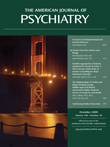Suicide Attempts, Gender, and Sexual Abuse: Data From the 2000 British Psychiatric Morbidity Survey
Abstract
Objective: The purpose of this study was to utilize data from the 2000 British National Survey of Psychiatric Morbidity, a randomized cross-sectional survey of the British population that included questions relating to the phenomena of suicidality and sexual abuse, to test the hypothesis that suicide attempts in women are significantly associated with a history of sexual abuse. Method: Participants were male and female volunteers, ages 16 to 74 years old (N=8,580), interviewed in the 2000 British National Survey of Psychiatric Morbidity. Results: Sexual abuse was strongly associated with a history of suicide attempts as well as of suicidal intent and was more common in women. The population attributable risk fraction was considerably greater in female respondents (28%) than in male respondents (7%), which is consistent with more prevalent exposure to sexual abuse among women. The effect of sexual abuse on suicidal attempts and suicidal intent was reduced by controlling for affective symptoms, suggesting that the effect of the former was likely to be mediated by affective changes. Conclusions: Sexual abuse is a significant antecedent of suicidal behavior, particularly among women. In identifying suicidal behavior, it is important to consider the possibility of sexual abuse, since it implies a need for focused treatment.



